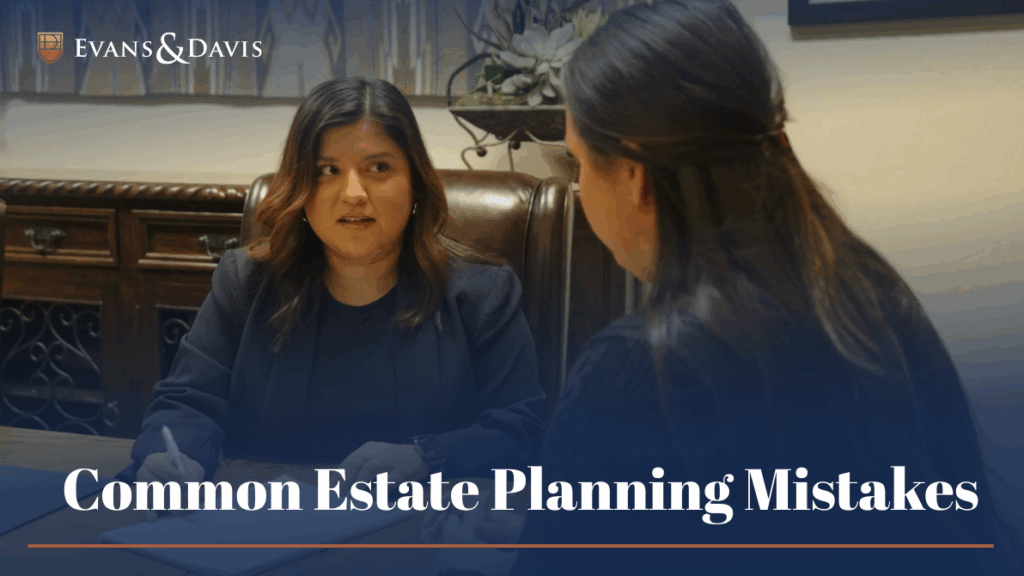Home | Estate Planning
Estate Planning
Our team helps families and individuals create thoughtful plans that protect what matters most. Our attorneys work closely with clients to understand their goals—providing for loved ones, preserving family businesses, reducing stress and costs for future generations, transferring real estate and other assets—all while minimizing administrative costs and taxes.

Step 1: Schedule Your Initial Meeting
Start by contacting our firm. Our team members will then work with you to coordinate a meeting date and time most convenient for all involved parties.
Step 2: Tell Us About Your Family
You will be provided with a simple and confidential Estate Planning Intake Form to assist you with gathering the necessary information to better inform your attorney in formulating the best plan for you and your loved ones.


Step 3: Meet With Your Estate Planning Attorney
During your initial consultation with an attorney, you will learn about the benefits of a properly implemented estate plan and the importance of making the right investment in your family. During this meeting, you will be able to openly discuss your objectives for your plan and discuss specific items related to your family in a safe, welcoming environment. Your initial consultation normally lasts 1.5 hours and culminates in your attorney providing you with a proposed course of action along with the associated fees to assist you.
Step 4: Review Drafts of Your Estate Plan
Upon retaining our Firm to assist with your investment, your attorney will provide you with a list of ‘homework’ items and drafts of your estate planning documents to review. Upon consideration, you will be able to provide your attorney with any question, comments, or any revisions you might have as a result.


Step 5: Finalize Your Estate Plan
At the meeting to sign your estate planning documents, you will meet with your attorney and execute the documents in the presence of a Notary Public and two independent witnesses. Upon signing, the Firm will then finalize the necessary steps to properly implement your estate plan, provide you with a digital, encrypted copy of the same, and the original documents will be provided to you for safe keeping.
Frequently Asked Questions
How Do We Help?
Every plan is tailored to a client’s unique circumstances and designed to adapt as laws and life change. By collaborating with financial and tax advisors, we ensure legacies are secure, wishes are honored, and loved ones are cared for with clarity and confidence
Who Do We Serve?
From Fortune 500 executives to first-time planners, we are proud to serve a diverse range of clients with the same level of care and commitment.
Which Tools Do We Utilize?
Estate planning tools we utilize include:
- Revocable Living Trusts
- Last Will & Testaments
- Qualified Personal Residence Trusts
- Irrevocable Life Insurance Trusts
- Gift and Charitable Giving Programs & Trusts
- Generational Skipping Trusts & Dynasty Trusts
- Grantor Retained Annuity Trusts
- Analysis of available Discounts in Valuing Business Assets
- Family Limited Partnerships and Family Limited Liability Companies
- Financial/Durable Powers of Attorney and Advance Health Care Directives
Client Testimonials
Evans & Davis in Edmond was highly recommended by several of our friends to handle our estate/trust early this year. We received outstanding customer service, and we are now more secure in the future of our assets. The guidance we received throughout the entire process was educational and informative. We highly encourage others to set up a trust for their assets and family!
We enjoyed working with the attorneys from Evans & Davis in preparing our trust, and with getting assets transferred into the trust. They were professional, friendly, and patient as we went through the process.
Very helpful, responsive, and patient in helped me with my estate planning. Highly recommend them.
It was a pleasure doing business with Evans & Davis. Everyone was very professional and did a great job getting our estate all figured out. We are so glad to be associated with them.
Evans and Davis is our go to law firm for our estate plans, business succession, etc. The fantastic service along with the relationship we have built with the firm will serve our family and business for years ahead. We thank them for their dedicated time and service to us and look forward to working with them in the future.
While it’s possible to handle your estate planning by yourself, doing so may expose you to hidden risks. Drafting mistakes and failing to address tax consequences and other legal considerations can undermine your wishes. Meanwhile, probate complications can result in conflicts, delays, and unexpected costs for your family.
Whether a married couple should create joint or separate estate plans depends on the circumstances of each spouse and the collective context of your marriage. Most couples, including younger newlyweds, utilize joint planning to efficiently protect their uncomplicated estates. However, other couples need greater flexibility and should consider using separate plans, such as those who have blended families, are in at least their second marriage, or have complex assets.
When a married couple starts estate planning, they likely don’t have extensive knowledge about what to do and when. Whether they’re misinformed or just operating based on incorrect assumptions, many couples make the same common mistakes. Without skilled help to guide you through the process, it’s easy to fall into the same traps.



